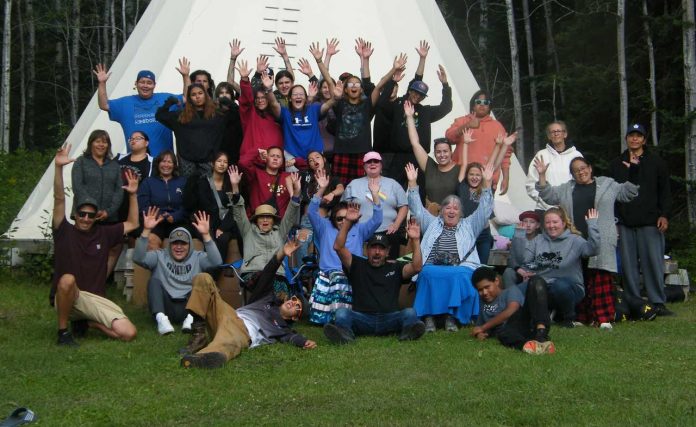
by Xavier Kataquapit
Indigenous youth from the Wabun Tribal Council territory came together for a land based event at the 16th Annual Wabun Senior Youth Gathering. The event was held in western Ontario in Neebing, Ontario at the School Of Indigenous Learning (SOIL), a land based traditional facility. The week long event from August 15 to 17 was held for youth between the ages of 14 to 18. The event was organized by the Wabun Tribal Council Health Department with the support of the tribal council’s member First Nations.
“It’s great to have this gathering every summer. I’ve been to this camp several times over the years and we all look forward to it as we get to make new friends and stay in touch with others we got know from other communities. It makes me happy to be here to see everyone, to learn about our culture and our language,” said 15 year old Kiara Millen, of Brunswick House First Nation.
The youth gathering brought together Wabun youth to take part in activities to learn about culture, traditions and language on the land. Daily events featured traditional smudging ceremonies, sharing circles and group gatherings where history, teachings and storytelling was taught by Elders and traditional teachers. The daily teaching events also included traditional activities including birch bark making, language lessons and drumming and singing.
“Our youth look forward to this annual gathering as it allows them to connect with friends they make from other First Nations. It keeps our youth connected to one another in a shared environment where they also get to learn about this history, their culture, their language and their people,” said Josee Forget, Wabun Regional Crisis Coordinator and event organizer.
Wabun Youth took part in traditional food methods including the plucking and preparation of wild goose, as well as preparing and eating other wild foods including fish and moose meat. They spent evenings around camp fires where traditional stories and history was shared. They also spent several nights camping where they slept in a traditional teepees that were set up at the wilderness camp. One day of events included a hike in the nearby wilderness to a scenic lookout where they performed ceremonies and a drumming circle.
Jeordi Pierre, owner and operator of the School Of Indigenous Learning (SOIL) features this land based organization as a facility to share and promote Indigenous culture to First Nation people, youth and the public at large to foster understanding and education on Indigenous issues.
“Our youth deserve every opportunity to learn about their culture and history. These were such wonderfully attentive and helpful group of young men and women and it was pleasure to serve them,” commented Pierre.
He and his mother Elder and Honourary Doctor Marlene Pierre, who are both from Fort William First Nation, lead the SOIL land based organization to provide traditional teachings and sharing. They work together with Dorothy Rody, a traditional teacher who is from Animbiigoo Zaagi’igan Anishinaabek.
Lessons and presentations at the Wabun Youth Gathering were also provided by health care teachers about health lifestyles and self care. Special lessons were also provided to youth concerning gender diversity, suicide prevention and grief counselling. Facilitators from the Thunder Bay Indigenous Friendship Centre assisted in guiding the youth.
“It felt good to be around people where we were all able to laugh, share stories and have a lot of fun. I got to reconnect to many people I got to know over the years. This gathering is special for me because it will be the last time I can take part as a youth participant. But I hope to come back again as a chaperone in the future,” explained 18 year old Leeon Prince, of Mattagami FN.
Prince is one of many Wabun youth over the past 16 years who have attended the annual gathering over the years starting as a junior participant and then graduating to the senior event.
At the end of the week of events, the Wabun Youth were also given a tour of Lakehead University in Thunder Bay.
Wabun Health leadership and staff led the planning and development of this year’s event.
“This is an important event for our young people as we need to expose them to land based events where we can place them in a traditional setting. When we spend time on the land we are more able to share the traditional teachings and lessons of our people’s past,” explained Angie Collins, Wabun Health Director.
The Wabun Elder for the event was Elder Laura Flood of Matachewan FN.
The Wabun Youth Gathering originated through the vision and dream of Wabun Elder Thomas Saunders of Brunswick House FN who lobbied for a youth gathering. The first gathering was held in Mattagami FN in 2007 through the leadership of past Health Director Jean Lemieux of Matachewan FN. Sadly, Elder Saunders passed on before his dream came to be.
Wabun Tribal Council is a regional territorial organization which represents the six First Nation communities of Beaverhouse, Brunswick House, Chapleau Ojibwe, Flying Post, Matachewan and Mattagami in Northeastern Ontario and it is directed by its respective Chiefs.
